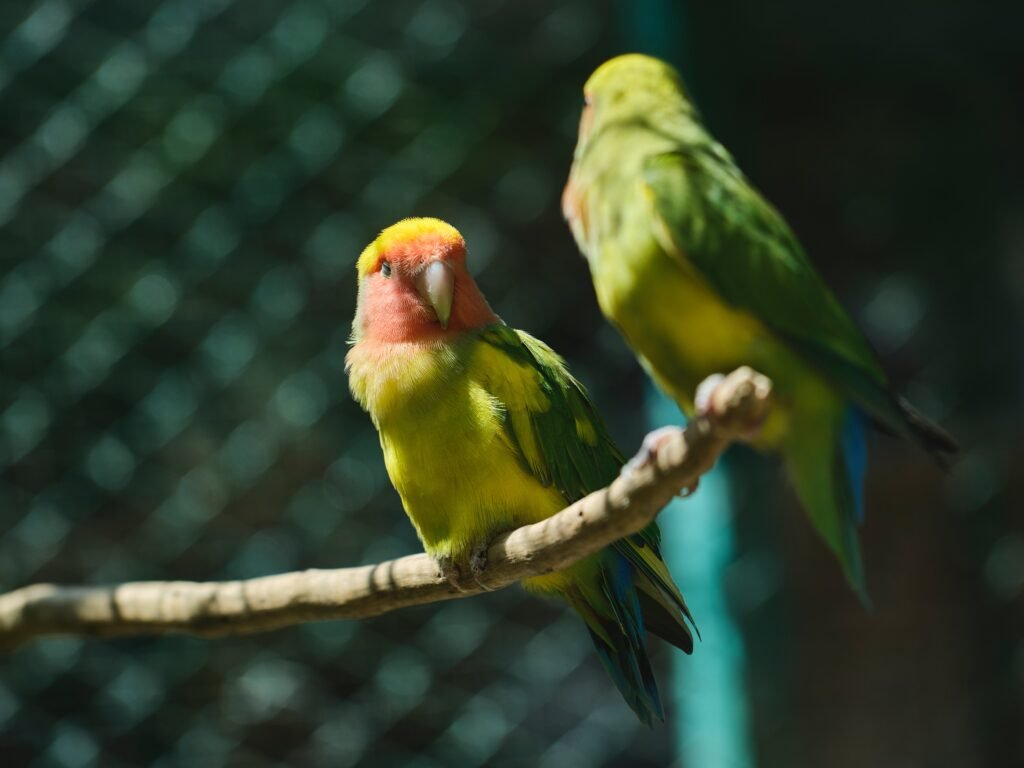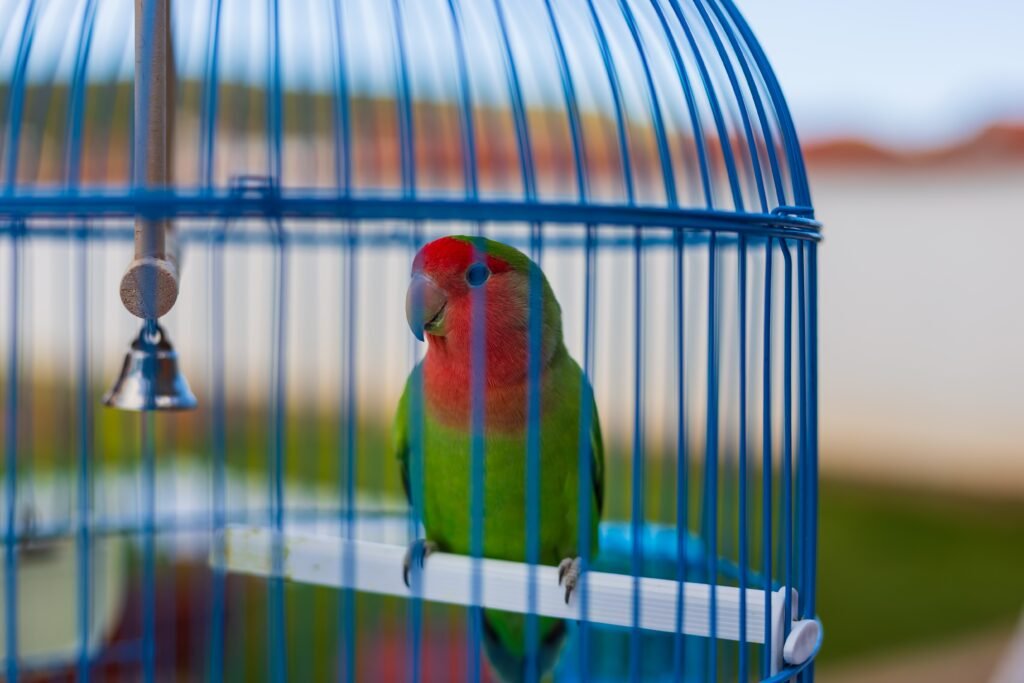 Lovebirds are adorable and popular pets known for their affectionate behavior and beautiful plumage. These small parrots, native to Africa, have become a favorite among bird enthusiasts. If you are considering getting lovebirds or already own a pair, you may wonder if they exhibit any aggressive or harmful behavior towards their own offspring. In this article, we will explore the intriguing question: do lovebirds kill their babies?
Lovebirds are adorable and popular pets known for their affectionate behavior and beautiful plumage. These small parrots, native to Africa, have become a favorite among bird enthusiasts. If you are considering getting lovebirds or already own a pair, you may wonder if they exhibit any aggressive or harmful behavior towards their own offspring. In this article, we will explore the intriguing question: do lovebirds kill their babies?
Lovebird Breeding Behavior
Lovebirds are monogamous birds that form strong pair bonds. They are highly social creatures and rely on their partners for companionship, protection, and mating. When a pair of lovebirds successfully mates and lays eggs, they usually display remarkable parenting skills and take great care of their offspring. However, there are certain circumstances where lovebirds may exhibit aggressive behavior towards their own babies.
Lovebirds are known for their caring nature and nurturing behavior when it comes to their babies. They will diligently protect and provide for their young ones, ensuring their safety and well-being. However, there are instances where lovebirds may unintentionally harm or neglect their babies due to their lack of experience as parents. Similar to humans, lovebirds can be inexperienced parents if they are breeding for the first time. This lack of knowledge and experience can lead to unintentional harm or neglect.
Factors That Influence Lovebird Parental Behavior
- Inexperienced Parents: Like humans, lovebirds can be inexperienced parents if they are breeding for the first time. In such cases, they may make mistakes or be unsure about how to properly care for their babies. This lack of knowledge and experience can lead to unintentional harm or neglect. It is important to provide support and guidance to these first-time parents to ensure the well-being of their offspring.
- Lack of Nesting Space: Lovebirds need a suitable nesting space to build their nests and lay eggs. Inadequate space can lead to cramped conditions, causing stress, aggression, and potential harm to their babies. Providing lovebirds with a spacious nesting box or cage that allows them to build a nest comfortably is essential. This will provide enough space for the growing babies and minimize the risk of aggression or harm.
- Stress and Fear: Lovebirds are sensitive creatures, and if they feel threatened or stressed, they may exhibit aggressive behavior towards their offspring. Factors such as excessive noise, disruptions, or predators in the vicinity can trigger stress responses. Creating a peaceful and calm environment for lovebird parents is crucial in preventing aggressive behavior towards their babies. Minimizing loud noises and sudden disruptions can help alleviate stress and promote a nurturing environment.
- Health Issues: Lovebirds that are sick or suffering from any health condition may not be able to care for their babies properly. In some cases, they may even harm or abandon their young ones due to their own physical limitations. Ensuring that lovebirds receive proper veterinary care and have a balanced diet is essential in maintaining their overall health. A healthy parent is more likely to exhibit good parenting skills and care for their babies.
Instances of Lovebirds Killing Their Babies
While lovebirds are generally great parents, there have been instances where they have been observed killing or harming their own offspring. It is important to note that these cases are relatively rare, and most lovebirds are attentive and caring parents. However, understanding these instances can help bird owners take necessary precautions and provide a suitable environment for their pets.
- Territorial Aggression: Lovebirds can become highly territorial during the breeding season. If they perceive any threat to their nest or eggs, they may attack and kill their babies in an attempt to protect their territory. This behavior is particularly common in first-time parents or when the nesting space is inadequate. Providing a secure nesting environment and minimizing disturbances can help reduce territorial aggression.
- Sibling Rivalry: In some cases, lovebirds may engage in aggressive behavior towards their own offspring due to sibling rivalry. This can occur when there is limited food or space, leading to competition among the babies. The dominant chick may attack and kill its younger siblings to ensure its own survival. Ensuring an adequate food supply and providing enough space for each baby can help minimize sibling rivalry and aggression.
- Maternal Aggression: Female lovebirds can also display aggressive behavior towards their own babies. This can occur if the mother is stressed, feels threatened, or is experiencing hormonal imbalances. Maternal aggression is more common in certain lovebird species, such as the Fischer’s lovebird. Providing a peaceful and stress-free environment for the mother lovebird can help prevent maternal aggression and ensure the safety of the babies.
Preventing Harm to Lovebird Babies
To ensure the safety and well-being of lovebird babies, it is essential to create a suitable environment and provide proper care. Here are some preventive measures you can take:
- Adequate Nesting Space: Provide lovebirds with a spacious nesting box or cage that allows them to build a nest comfortably and provide enough space for the growing babies. This will minimize stress and aggression caused by cramped conditions.
- Avoid Disturbances: Minimize loud noises, sudden disruptions, or any factors that may cause stress to the lovebird parents. Create a peaceful and calm environment for them to raise their young ones. This will help reduce the risk of aggressive behavior towards the babies.
- Separation of Parents and Babies: In cases where lovebirds display aggressive behavior towards their babies, it may be necessary to temporarily separate them until they calm down. However, this should be done under the guidance of an avian veterinarian or an experienced bird breeder. Seeking professional advice is crucial in handling such situations.
- Proper Nutrition: Ensure that lovebirds are provided with a well-balanced diet that includes fresh fruits, vegetables, seeds, and pellets. A healthy parent is more likely to exhibit good parenting skills and care for their babies. Providing proper nutrition will contribute to the overall well-being of the lovebird parents and their babies.
- Monitoring and Assistance: Regularly monitor the lovebird parents and their babies. Look out for any signs of aggression, neglect, or health issues. If you notice any concerns, seek professional advice from a veterinarian specializing in avian care. Regular check-ups and consultations will help ensure the early detection and prevention of any potential problems.
Conclusion
Lovebirds, like any other living beings, can display a range of behaviors, including aggression towards their offspring. While it is essential to be aware of this possibility, it is important to note that such instances are relatively rare. Most lovebirds are devoted and attentive parents who take great care of their babies. By providing a suitable environment, proper nutrition, and monitoring their behavior, you can help ensure a safe and nurturing environment for lovebird parents and their adorable babies.
FAQ
1. Do lovebirds always kill their babies?
No, lovebirds do not always kill their babies. Most lovebirds are devoted and attentive parents who take great care of their offspring. Instances of lovebirds killing their babies are relatively rare.
2. What factors can influence lovebird parental behavior?
Several factors can influence lovebird parental behavior, including:
- Inexperienced parents: Lovebirds breeding for the first time may lack knowledge and experience in caring for their babies.
- Lack of nesting space: Inadequate space can cause stress and aggression, leading to harm to the babies.
- Stress and fear: Lovebirds may exhibit aggressive behavior towards their offspring if they feel threatened or stressed.
- Health issues: Sick or unhealthy lovebirds may not be able to properly care for their babies.
3. Why do lovebirds kill their babies?
Lovebirds may kill their babies due to territorial aggression, sibling rivalry, or maternal aggression. Territorial aggression occurs when lovebirds perceive a threat to their nest or eggs. Sibling rivalry can occur when there is limited food or space, leading to competition among the babies. Maternal aggression may be caused by stress, feeling threatened, or hormonal imbalances.
4. How can harm to lovebird babies be prevented?
To prevent harm to lovebird babies, the following measures can be taken:
- Provide adequate nesting space to minimize stress and aggression caused by cramped conditions.
- Minimize disturbances and create a peaceful environment for the lovebird parents.
- Temporarily separate parents and babies in cases of aggressive behavior, under professional guidance.
- Ensure lovebirds receive a well-balanced diet for their overall health and good parenting skills.
- Regularly monitor the parents and babies for any signs of aggression, neglect, or health issues, seeking professional advice when necessary.


